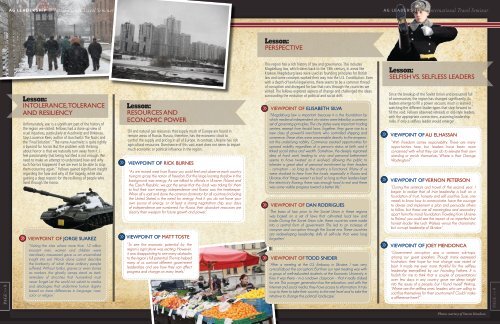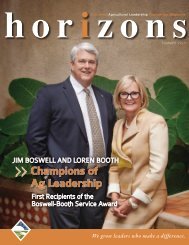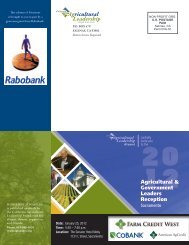hori zons
April 2012 - California Agricultural Leadership Foundation
April 2012 - California Agricultural Leadership Foundation
You also want an ePaper? Increase the reach of your titles
YUMPU automatically turns print PDFs into web optimized ePapers that Google loves.
AG LEADERSHIP >> International Travel Seminar<br />
AG LEADERSHIP >> International Travel Seminar<br />
PERSPECTIVE<br />
PAGE >> 8<br />
INTOLERANCE, TOLERANCE<br />
AND RESILIENCY<br />
Unfortunately, war is a significant part of the history of<br />
the region we visited. Fellows had a close-up view of<br />
cruel injustices, particularly at Auschwitz and Birkenau.<br />
Says Laurence Rees, author of Auschwitz: The Nazis and<br />
the ‘Final Solution’: “The name Auschwitz is quite rightly<br />
a byword for horror. But the problem with thinking<br />
about horror is that we naturally turn away from it. I<br />
feel passionately that being horrified is not enough. We<br />
need to make an attempt to understand how and why<br />
such horrors happened if we are ever to be able to stop<br />
them occurring again.” Fellows gained significant insight<br />
regarding the how and why of the tragedy, while also<br />
gaining a deep respect for the resiliency of people who<br />
lived through the horror.<br />
>><br />
RESOURCES AND<br />
ECONOMIC POWER<br />
Oil and natural gas resources that supply much of Europe are found in<br />
remote areas of Russia. Russia, therefore, has the economic clout to<br />
control the supply and pricing in all of Europe. In contrast, Ukraine has rich<br />
agricultural resources. Dominance of this vast asset does not seem to impart<br />
much economic or political influence in the region.<br />
VIEWPOINT OF RICK BURNES<br />
“As we moved west from Russia you could feel and observe each country<br />
trying to grasp the notion of freedom. But the large looming shadow in the<br />
background was energy. As we talked to officials in Ukraine, Poland and<br />
the Czech Republic, we got the sense that the clock was ticking for them<br />
to find their own energy independence and Russia was the timekeeper.<br />
When all is said and done the common dominator for all countries (including<br />
the United States) is the need for energy. And if you do not have your<br />
own source of energy, or at least a strong negotiation chip, your days<br />
of independence are numbered. For Russia, their abundant resources are<br />
clearly their weapon for future growth and power.”<br />
>> >> VIEWPOINT OF MATT TOSTE<br />
VIEWPOINT OF JORGE SUAREZ<br />
“Visiting the sites where more than 1.2 million<br />
innocent men, women and children were<br />
mercilessly massacred gave us an unvarnished<br />
insight into evil. Words alone cannot describe<br />
the barbarity of what these ordinary people<br />
suffered. Without tombs, graves or even stones<br />
as markers, the ghostly camps stand as stark<br />
reminders of atrocities that humankind must<br />
never forget. Let the world not submit to credos<br />
and ideologies that undermine human dignity<br />
based on mere differences in language, race,<br />
color or religion.”<br />
“To see the economic potential for the<br />
region’s agriculture was exciting. However,<br />
it was disappointing to see many obstacles<br />
to the region’s full potential. The trip helped<br />
many of us contrast different government<br />
leaderships and see how they can affect<br />
progress and change on many levels.”<br />
This region has a rich history of law and governance. This includes<br />
Magdeburg law, which dates back to the 13th century, in areas like<br />
Krakow. Magdeburg laws were used as founding principles for British<br />
law and some concepts worked their way into the U.S. Constitution. Even<br />
with a depth of lawful experience, there seems to be a common thread<br />
of corruption and disregard for law that runs through the countries we<br />
visited. The fellows explored aspects of change and challenged the ideas<br />
surrounding the evolution of political and social drift.<br />
>><br />
>><br />
>><br />
VIEWPOINT OF ELISABETH SILVA<br />
“Magdeburg law is important because it is the foundation by<br />
which medieval independent city-states were linked by a common<br />
set of governing principles. The city-states were important trading<br />
centers, exempt from feudal laws. Together, they gave rise to a<br />
new class of powerful merchants who controlled shipping and<br />
commerce. These cities were answerable directly to the emperor,<br />
not the underlying nobility. Commerce created opportunities for<br />
upward mobility regardless of a person’s status at birth and it<br />
linked social status and wealth. Somehow, the deeply ingrained<br />
idea of hard work leading to civic and personal betterment<br />
seems to have twisted as it evolved, allowing the public to<br />
tolerate a great deal of personal enrichment by their leaders<br />
– corruption – so long as the country is functional. Many of us<br />
were shocked to hear from the locals, especially in Russia and<br />
Ukraine, that ‘things weren’t so bad’ so long as their leaders kept<br />
the electricity flowing, there was enough food to eat and there<br />
was some visible progress toward a better life.”<br />
VIEWPOINT OF DAN RODRIGUES<br />
“The basis of law prior to the Soviet Union in these regions<br />
was based on a set of laws that cultivated local law and<br />
trade. During the Soviet Union rule, these countries were made<br />
into a central form of government. This led to an increase of<br />
cronyism and corruption through the Soviet era. These countries<br />
are redeveloping leadership skills of self-rule that were long<br />
forgotten.”<br />
VIEWPOINT OF TODD SNIDER<br />
“After a meeting at the U.S. Embassy in Ukraine, I was very<br />
cynical (about the corruption). But then our next meeting was with<br />
a group of well-educated students at the Economic University in<br />
Kiev. It was there – in a rundown classroom – that it really clicked<br />
for me. This younger generation has the education, and with the<br />
Internet and social media, they have access to information. It truly<br />
is up to them to take their country to the next level and to take the<br />
initiative to change the political landscape.”<br />
>><br />
>><br />
>><br />
SELFISH VS. SELFLESS LEADERS<br />
Since the breakup of the Soviet Union and presumed fall<br />
of communism, the region has changed significantly. As<br />
leaders emerge to fill a power vacuum, much is learned<br />
watching the different leader-types that step forward to<br />
fill the void. Fellows observed retreads or old-style leaders,<br />
with the appropriate connections, assuming leadership<br />
roles. If only a selfless leader would emerge!<br />
VIEWPOINT OF ALI ELHASSAN<br />
“With freedom comes responsibility. There are many<br />
opportunities here, but leaders have been more<br />
concerned with what they can do to elevate their own<br />
standing or enrich themselves. Where is their George<br />
Washington?”<br />
VIEWPOINT OF VERNON PETERSON<br />
“During the seminars and travel of the second year, I<br />
began to realize that all true leadership is built on a<br />
foundation of trust, honesty and self sacrifice. Sure, one<br />
needs to know how to communicate, have the courage<br />
to devise and implement a plan and persuade others<br />
to follow, but these are all meaningless and secondary<br />
apart from this moral foundation. Traveling from Ukraine<br />
to Poland, you could see the impact of an imperfect but<br />
honest leader like Lech Walesa versus the charismatic<br />
but corrupt leadership of Ukraine.”<br />
VIEWPOINT OF JOEY MENDONCA<br />
“Government corruption was a common sub-topic<br />
among our guest speakers. Though many expressed<br />
frustration, their hope for true change was mixed at<br />
best. It made me ever more thankful for the selfless<br />
leadership exemplified by our Founding Fathers. It is<br />
foolish for me to think that a couple of presentations<br />
over few days in any country gave me deep insight<br />
into the issues of a people, but I found myself thinking,<br />
‘Where are the selfless ones, leaders who are willing to<br />
sacrifice themselves for their countrymen? Could I make<br />
a difference here?’”<br />
PAGE >> 9<br />
Photos courtesy of Steven Knudsen.




